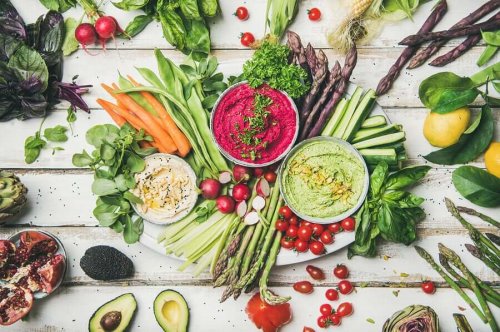The Vegan Teenager: A Growing Trend


Written and verified by Doctor Irene Nora Melamed
There are pros and cons to being a vegan teenager. This is because a diet based exclusively on plants can improve your health and help maintain your optimal weight. However, this diet has certain implications that are still controversial. This is because it can lead to a deficit of certain nutrients if you don’t plan it properly.
So, what do you need to know about going vegan?
What does it mean to be vegetarian or vegan?
Due to a large number of articles in the media (added to the many professional conferences on the subject), it appears that there are more teenage vegans than ever before. At the same time, there are several controversies around this diet, in addition to the disagreements between parents and children.
R. González Leal, a member of the Endocrinology Service at the Hospital Infantil Universitario Niño Jesús in Madrid, provides a basic definition of the differences between veganism and vegetarianism:
The two most common types of vegetarian diets are vegan diets, in which a person doesn’t eat anything that comes from an animal, and “vegetarian diets,” which exclude meats but still includes eggs and dairy products.

Behind the scenes: Why is there a preference for vegan diets?
Overall, the most frequent reasons for choosing a vegetarian diet are health considerations, concern for the environment, and factors related to animal welfare.
Also, some vegetarian people cite economic reasons, ethical considerations related to world hunger, and religious beliefs as reasons to follow the vegan food model. Many have had this dietary habit since childhood if they grew up in vegetarian families.
Read also: How To Make Vegan Mayonnaise
The vegan teenager: A concerning, risky, and growing reality
Adopting a vegetarian diet can lead to a reduction in the intake of certain nutrients. However, you can avoid deficiencies by following a well-planned vegetarian diet that includes vegetables, fruit, whole grains, legumes, nuts and seeds to obtain adequate nutrition.
You must also consider that, when it comes to vegetarianism, two populations are particularly susceptible or at risk.
- The first group is children and teenagers, who are still developing and need all the nutrients they can get. This includes amino acids, in particular.
- The second group is females because they need more iron. This mineral is present in legumes and plant-based food, of course. However, its bioavailability is smaller than in meat.
Vegetables and legumes contain plenty of iron, but the human body can’t assimilate it the same way it assimilates the iron of animal origin.

Are there any health benefits to being a vegan teenager?
While there are some benefits to these dietary patterns, you shouldn’t ignore the existence of some controversial elements that could be harmful to your health.
In this regard, here are some additional data:
- When properly planned, vegetarian diets are often associated with various health benefits.
- While animal protein contains all the essential amino acids, vegetable proteins are deficient in some (limiting). For instance, cereals have lysine as the limiting amino acid, while legumes contain limiting methionine and threonine.
- The adolescence stage is the most frequent one for the onset of eating disorders.
Discover: The Seven Best Sources of Vegan Protein
Conclusion
The US National Library of Medicine stands out when it comes to things to consider when following a vegan or a vegetarian diet. You must:
- Eat different types of foods, including vegetables, fruit, grains, nuts, seeds, whole grains. Add dairy products and eggs if your diet allows them.
- Opt for fortified foods, such as grains, bread, soy, and almond milk, and natural fruit juice to obtain a wide variety of nutrients.
- Avoid food that’s too rich in fat, sugar, and sodium (salt).
- Include at least one source of protein in all your meals.
- Take supplements if your diet lacks certain vitamins and minerals.
- Keep in mind that Vitamin B12 is necessary to help prevent anemia. Eggs and dairy are rich in B12, which is the reason why vegans may have difficulty getting enough of it.
- Learn to read the nutrition labels on food packages, as they list the ingredients and nutritional content of the product.
Finally, work with a nutritionist to make sure you’re getting all of the nutrients you need when adopting a restricted diet.
All cited sources were thoroughly reviewed by our team to ensure their quality, reliability, currency, and validity. The bibliography of this article was considered reliable and of academic or scientific accuracy.
- Temas de revisión. “Alimentación vegetariana en adolescentes: pros y contras”. ADOLESCERE • Revista de Formación Continuada de la Sociedad Española de Medicina de la Adolescencia • Volumen V • Septiembre 2017 • Nº 3.
- Biblioteca Nacional de Medicina de los EE.UU.
This text is provided for informational purposes only and does not replace consultation with a professional. If in doubt, consult your specialist.








